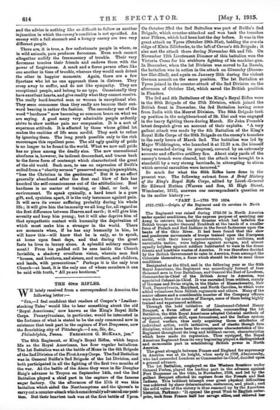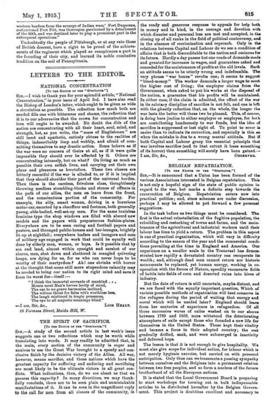THE 6Orn RIFLES.
WE lately received from a correspondent in America the following letter:— "Sra,—I feel confident that readers of Cooper's ' Leather- stocking Tales' would like to hear something about the old • Royal Americans,' now known as the King's Royal Rifle Corps. Pennsylvanians, in particular, would be interested fa the fortunes of what is stated to be the only command now in existence that took part in the capture of Fort Duquesne, now the flourishing city of Pittsburgh.—I am, Sir, &e_, Philadelphia, Pease. FREDBEIC X G. McKzaw, jun."
The 60th Regiment, or King's Royal Rifles, which began life as the Royal Americans, has four regular battalions. The 1st Battalion was at the battle of Mona in the 6th Brigade of the 2ndDivision of the FirstAnny Corps. The 2nd Battalion was in General Balfin'e 2nd Brigade of the 1st Division, and both participated in all the fighting of the first two months of the war. At the battle of the Aisne they were in Sir Douglas Haig's advance to Troyon on September 14th, and the 2nd Battalion played a chief part in the capture of the fannies sugar factory. On the afternoon of the 17th it was this battalion which aided the Northampton and the Queen's to carry out a counter-attack which considerably advanced our posi- tion. But their heaviest task was at the first battle of Ypres. On October 23rd the 2nd Battalion was part of Bnlfin's 2nd Brigade, which counter-attacked and won back the trenches near Pilkem, which had been lost the day before. It was in the great attack on Ypres (October 29t11-31st), holding the nu cia ridge of Klein Zillebeeke., to the left of Cavan's 4th Brigade ; it also met the attack there during November 6th and 7th. On November 12th Lieutenant Dimmer of this battalion won the Victoria Cross for his stubborn fighting of his machine. gun. In December, when the 1st Division was moved to La Bassee, the battalion was in action in the attack on Givenchy (Decem- ber 21st-22nd), and again on January 25th during the violent German assault on the same position. The let Battalion at Ypres joined in the counter-attack of the 2nd Division on the afternoon of October Slat, which saved the British position in Flanders.
The 3rd and 4th Battalions of the King's Royal Rifles were in the 80th Brigade of the 27th Division, which joined the British front in December, the 3rd Battalion having come from India with the Meerut Division. The 80th Brigade took up position in the neighbourhood of St. Eloi and was engaged in the heavy fighting there during March. Sir John French's latest despatch gives an account of their exploits. "A very gallant attack was made by the 4th Battalion of the King's Royal Rifle-Corps of the 80th Brigade on the enemy's trenches in the early hours of March 2nd. The battalion was led by Major Widdrington, who launched it at 1330 a.m. (he himself being wounded during its progress), covered by an extremely accurate and effective artillery fire. About sixty yards of the enemy's trench were cleared, but the attack was brought to a standstill by a very strong barricade, in attempting to storm which several casualties were incurred."
So much for what the 60th Rifles have done in the present war. The following extract from A Brief History of the King's Royal Byte, Corps, edited by Lieot.General Sir Edward Hutton (Warren and Son, 85 High Street, Winchester, 1912), answers our correspondent's question as to its earlier history PART L-1755 TO 1824.
1765-1763.—Origin of the Rseinsist and its services in Forth America.
The Regiment was raised during 1755-50 in North America under special conditions, for the express purpose of assisting oar Army to retrieve the terrible disaster which had befallen the British troops under General Braddoek at the hands of a smaller force of French and Red Indians in the forest fastnesses upon the banks of the Ohio River. It bad been found that the slow and ponderous movements of troops trained open the European model, with their heavy accoutrements, tight uniforms, and unsuitable tactiee, were helpless against savages, and almost equally helpless against soldiers habituated to wars in the dense forests and trackless wastes of America. It was therefore decided by the British Government to raise he America, from amongst the Colonists themselves, a force which should be able to meet these conditions.
Designated as the 62nd, and in the following year as the 60th Royal Americans, the Regiment was accordingly formed of four thousand men in four Battalions, and General the Earl of Loudorm, Commander-in-Chief of the British Army in America, was appointed Colonel-in-Chief. It was recruited from settlers, mainly of German and Swiss origin, in the States of Massachusetts, New York, Pennsylvania., Maryland, and North Carolina, to which were added volunteers from British regiments and others. Many of the senior officers and a considerable number of the Company officers were drawn from the armies of Europe, some of them being highly trained and experienced soldiers. Through the bold initiative of Lieutenant-Colonel Henry Bouquet, a Swiss officer of distinction, commanding the 1st Battalion, tho 80th Royal Americans adopted Colonial methods of equipment, simpler drill, open formations, and the radian system of forest warfare, thus early acquiring those attributes of individual action, swift initiative, and of elastic though firm discipline, which have been the conspicuous characteristics of the Regiment throughout its long and brilliant career, characteristics which have made its reputation. Thus equipped, the Royal American Regiment from its very beginning played a distinguished sad memorable part in establishing British power in North funnies.
The great struggle between Brame and England for supremacy in America was at its height, when early in 1758, Abercromby, who had succeeded Loudon." as Commander-in-Chief, decided upon a general advance. The lst Battalion, employed en the Western frontiers under General Forbes, played the leading part in the advance against Fort Duquesne on the Ohio, in November, 1758, and led by the gallant Bouquet effected its captors from the French and Red Indians. This brilliant triumph over great physical difficulties was achieved by sheer determination, endurance, and pluck ; and the vial value of the victory is thus summed up by the American historian, Parkman : 'It opened the great West to English enter- prise, took from Prance half her savage allies, and relieved her western borders from the scourge of Indian wars! Fort Duquesne, rechristened Fort Pitt, was thereupon garrisoned by a detachment of the 60th, and was destined later to play a prominent part in the subsequent operations."
Undoubtedly the people of Pittsburgh, or at any rate those of British descent, have a right to be proud of the achieve- ments of the regiment which played so conspicuous a part in the founding of their city, and learned its noble combative tradition on the soil of Pennsylvania.



































 Previous page
Previous page